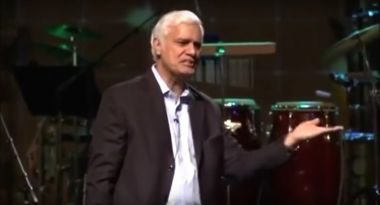The infinite human capacity to deceive ourselves and then rationalize it

Two days before Christmas, Ravi Zacharias International Ministries confirmed that its founder had engaged in sexual misconduct over the course of many years and promised further information when the investigation into the matter was complete. This month, RZIM released the full report as they had received it, along with an extended, contrite statement of apology.
Ravi was a significant personal influence and a great friend of the Colson Center. When Ravi died in May of last year, we honored him. At the time, both Ravi and RZIM leadership claimed that allegations of an inappropriate relationship had been dismissed and disproven after a thorough investigation. We trusted the information provided to us. We were wrong. I both believed and shared excuses that explained Ravi's behavior. By doing that, I was wrong and misled others. To be clear, no one at the Colson Center had any sense just how much would be revealed in this final report. But I wish I had not been so quick to trust what I wanted to be true.
There is no sugar-coating, excusing, or explaining away Ravi's behavior. It was sinful. It was wicked. And, as this report made crystal clear, it was duplicitous. Reading through it, I couldn't shake the words I heard time and time again from Chuck Colson: "There is no limit to the human capacity for self-rationalization."
That's why Proverbs uses the word "folly" to describe sin. As a mentor of mine used to say, sin makes us dumb. Buried in sin, we become fools, actually convincing ourselves that, for the first time in human history, we will be the ones to get away with it.
As sin takes us deeper than we ever imagined possible, others are dragged along into our self-deception. Sin always leaves other victims, human beings made in the image of God and for whom Christ died. The number of women Ravi abused, and the degree to which he deceived them, is breathtaking. RZIM has committed to make restitution and care for these women. I hope and pray they will. And there are other victims to remember: family members, friends, and the many disillusioned others around the world.
Recently, a BreakPoint listener emailed us asking how we should respond to cases like this, when a Christian leader or teacher is caught in sexual misconduct. Is it possible to separate the good that they've done and the truth they've taught, the person and their sin? What about in cases such as this, when the perpetrator is gone and has no further opportunity to acknowledge his sins, repent, and seek forgiveness?
We need not deny that Ravi's teaching helped many Christians make sense of the Faith, deal with their doubts, and engage other people with the Gospel, in order to acknowledge the depth of his depraved behavior. As my colleague Shane Morris pointed out a few weeks ago, no one is "made of finer clay" than anyone else. As St. Paul wrote, "There is none righteous, no not one."
It's also important to remember, to borrow a phrase popularized by Christian educator Arthur Holmes, "all truth is God's truth." In other words, if Ravi Zacharias ever said anything true in his life, and of course he did, he was not its source but only its medium. Any truth – all truth – comes ultimately from God, outside of time or place or context. Even if delivered by the most sinful voices, truth is as eternal and unchanging as God Himself.
A postmodern worldview, in contrast, relativizes truth to cultural settings or individuals. In other words, truth is not absolute. But, if truth is dependent on the shifting sands of attitudes, beliefs, perceptions of a culture or an individual, anything we build on it must collapse when any of those things do.
Of course, knowing that doesn't make what's happened any less painful, disorienting, or consequential, especially for all those women involved. Having talent, even amazing talent, to communicate does not give one a divine right or inherent privilege (and it is an incredible privilege) to have or to keep a public platform. Scripture is clear: teachers are stewards of the truth, and therefore held to a higher standard.
This is not the same thing as cancel culture, which is so popular in our time. Cancel culture cancels people because of their different beliefs. This is about behavior; this is about reprehensible behavior that deeply harmed other people.
Finally, let this be a reminder to not trust ourselves, but only God and His Spirit. Pray for your pastor, church leaders, spouse, and whomever else God has put in your life. We need His protection from the real and ever-present temptations, as well as from our own capacity to deceive ourselves and then rationalize our behavior.
Copyright2021 by the Colson Center for Christian Worldview. Reprinted from BreakPoint.org with permission.











